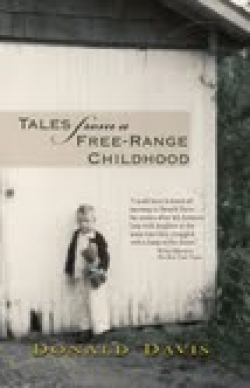Tales from a Free-Range Childhood
Donald Davis gave up his life as a minister to spread the word of his own life lessons as a full-time storyteller, for which he’s become well known. In Tales from a Free-Range Childhood, he recounts the days of his Appalachia youth from a time past and the pleasant cadence of the author’s dialect lends the stories a fluidity which, along with vivid imagery, enables a seamless transition from oration to the written word.
The book’s conversational tone and no-frills approach to storytelling further distinguishes itself from many contemporary collections of personal essays for its lack of sex, drugs, and profanity (something this reviewer found refreshing). Instead, Davis evokes a Norman Rockwell aesthetic, a view of an idealized, post-war American life with just a hint of what lies below the surface. Think of the painting Family Grace, where a young boy is seated at a table with an older couple. At first glance everything looks normal, until the viewer realizes the pair could be the boy’s grandparents and the portrait takes on another dimension.
In these stories, the reader learns the essence of the saying ‘boys will be boys.’ The tales jump around a little, but mostly follow Davis from the age of a toddler through his teenage years, when he gets his driver’s license and ends up in cahoots with his father over a totaled car. The stories are moralistic and wrap up in a manner not unlike the way a preacher might end a sermon.
Readers of a younger generation might be surprised to find that they have had comparable experiences to Davis’s boyhood. In one story, we learn about how the family came to own their first television. Remember the advent of the personal computer and the resultant changes to our households and the shape of our daily lives?
In the end, to borrow from the author’s writing style, a well-told true story is comfort food for the soul, and Davis’s book is nourishing.
Reviewed by
Mark Danowsky
Disclosure: This article is not an endorsement, but a review. The publisher of this book provided free copies of the book and paid a small fee to have their book reviewed by a professional reviewer. Foreword Reviews and Clarion Reviews make no guarantee that the publisher will receive a positive review. Foreword Magazine, Inc. is disclosing this in accordance with the Federal Trade Commission’s 16 CFR, Part 255.

